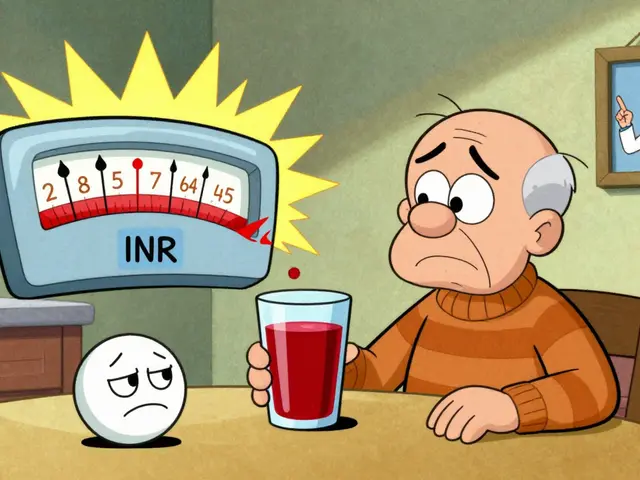Understanding Hemophilia: A Brief Overview
Before we delve into the specifics of caregiving for a person with hemophilia, it's crucial to understand what this condition is. Hemophilia is a rare disorder where the blood doesn't clot normally due to the lack of sufficient blood clotting proteins. This means that even a minor injury could lead to serious bleeding or internal bruising. There are two main types: Hemophilia A and Hemophilia B. It’s crucial to know which type a person has for effective management.
The Emotional Impact of Hemophilia
Living with hemophilia can be emotionally challenging for both the person with the condition and their loved ones. The constant fear of injuries and the potential complications can lead to stress, anxiety, and even depression. As a caregiver, it’s important to provide emotional support, encouraging open communication about fears and anxieties, and where possible, seek professional help such as a therapist or counselor.
Importance of a Healthy Diet in Hemophilia Care
Good nutrition is essential for everyone, but for people with hemophilia, it's particularly important. A well-balanced diet can help to maintain a healthy weight, which reduces the strain on joints and can help to prevent bleeding. The diet should be rich in iron to help replace the blood cells lost through bleeding, and vitamin K, which aids in blood clotting.
Physical Activity and Hemophilia
Despite the risks associated with physical injuries, maintaining an active lifestyle is crucial for individuals with hemophilia. Regular exercise strengthens the muscles, which can protect the joints from bleeding. However, it's important to choose low-impact activities like swimming, cycling, or walking, which are less likely to result in injuries. As a caregiver, encourage and support your loved one in safely engaging in regular physical activities.
Dealing with Bleeding Episodes
Knowing how to handle bleeding episodes is a critical part of caregiving for someone with hemophilia. Quick action can make a significant difference in the severity of the episode. The initial steps usually involve applying pressure to the site and using a cold pack to help reduce the blood flow. It’s also crucial to have an emergency plan in place, including having the contact information for their healthcare provider readily available.
Adhering to Medication and Treatment Protocols
Adherence to treatment protocols is vital in managing hemophilia. This might involve regular infusions of clotting factor, taking medications to boost clotting, or both. As a caregiver, you may need to help administer these treatments, keep track of medication schedules, or provide reminders for the individual with hemophilia.
The Importance of Regular Check-ups
Regular check-ups with a hematologist or a specialized hemophilia treatment center are essential for managing the condition. These check-ups allow for the monitoring of the individual's overall health, adjusting treatment plans as necessary, and catching any potential complications early. As a caregiver, your role may involve scheduling these appointments and providing transportation.
Ensuring a Safe Living Environment
Creating a safe living environment is another crucial aspect of caregiving for someone with hemophilia. This involves eliminating potential hazards that could lead to injuries, such as sharp corners or slippery surfaces. It also includes ensuring that the person with hemophilia wears protective gear when necessary, such as helmets, knee pads, and elbow pads.
Psychosocial Support for People with Hemophilia
Providing psychosocial support is a key aspect of caregiving. This involves fostering a supportive and encouraging environment where the person with hemophilia feels understood and accepted. It also includes advocating for the person with hemophilia in school or work settings, ensuring they have the necessary accommodations to manage their condition.
Self-care for Caregivers
Finally, while caring for a person with hemophilia can be rewarding, it can also be emotionally and physically demanding. Therefore, practicing self-care is crucial. This can involve taking time for yourself to relax and recharge, maintaining your own physical health, and seeking support from others, such as joining a support group for caregivers or talking to a mental health professional.

 Cranberry Products and Warfarin: What You Need to Know About Bleeding Risk
Cranberry Products and Warfarin: What You Need to Know About Bleeding Risk
 Buy Cheap Generic Celexa Online - Safe, Affordable, Quick
Buy Cheap Generic Celexa Online - Safe, Affordable, Quick
 Abhigra vs Other Sildenafil Brands: Full Comparison
Abhigra vs Other Sildenafil Brands: Full Comparison
 Bupropion and Epilepsy: A Potential Treatment Option?
Bupropion and Epilepsy: A Potential Treatment Option?
 How to Manage Interactions When Starting a New Medication
How to Manage Interactions When Starting a New Medication
S O'Donnell
July 21, 2023 AT 16:51When it comes to managing hemophilia on a day-to-day basis, the importance of a meticulously organized treatment schedule cannot be overstressed; every missed infusion or delayed dosage can cascade into a series of complications that ripple through both the patient and the caregiver. It is essential to create a calendar that not only lists the times of factor replacement but also cross-references them with appointments, blood work, and any planned physical activities, thereby reducing the cognitive load on the caregiver. Moreover, the caregiver should maintain a detailed log, noting the exact dosage, lot number, and any side effects observed after each administration, which serves as an invaluable resource during medical consultations. In addition, establishing a backup plan, such as having a secondary source of factor concentrate or a trusted neighbour trained in infusion techniques, adds a layer of resilience to the care regimen. While it might seem overly cautious, this redundancy often proves lifesaving in emergency scenarios where immediate access to clotting factors is paramount. The caregiver should also be vigilant about storage conditions; factor products are temperature-sensitive, and exposure to extreme heat can render them ineffective, so a dedicated refrigerator with temperature monitoring is advisable. When it comes to diet, incorporating iron-rich foods like spinach, lentils, and red meat can help replenish the blood lost during bleeds, but this should be balanced with vitamin K intake to support clot formation. Regular physical therapy sessions, focusing on low-impact exercises, can fortify musculoskeletal support, thereby mitigating joint bleeds, yet the therapist must be informed of the hemophilia type to tailor the regimen appropriately. Equally important is the psychological aspect; caregivers should schedule periodic check-ins with mental health professionals to process the emotional toll of constant vigilance. Communication with the healthcare team should be proactive; any subtle changes in bleeding patterns or joint health must be reported promptly to preempt larger issues. Additionally, leveraging technology-such as reminder apps, telemedicine platforms, and digital health trackers-can streamline coordination and reduce the chance of human error. Finally, self-care for the caregiver cannot be an afterthought; regular breaks, adequate sleep, and personal hobbies are integral to sustaining long-term care quality. By adhering to these comprehensive strategies, both the patient and the caregiver can navigate the complexities of hemophilia with greater confidence and fewer unforeseen complications.
Yamunanagar Hulchul
July 21, 2023 AT 22:24Wow, this guide is a treasure trove of practical wisdom! 🌟 The way you break down the diet, exercise, and safety tips is incredibly clear and uplifting!!! It really feels like a warm hug for anyone caring for a loved one with hemophilia, reminding us that with the right knowledge, we can turn challenges into opportunities for growth!!! The emphasis on low‑impact activities like swimming and cycling paints a vivid picture of fun, safe ways to stay active!!! And the mental‑health suggestions? Pure gold-because caring for the heart is just as vital as caring for the body!!! Keep spreading this positivity; it's a beacon of hope for countless families!!!
Sangeeta Birdi
July 22, 2023 AT 03:57Reading this made me feel both understood and hopeful 😊. It's so comforting to see that the emotional ups and downs of caregiving are acknowledged, and that we aren't alone in feeling the weight of responsibility. 🌈 The tips about creating a safe home environment really resonated with me – I’ve been slowly padding sharp corners and adding non‑slip mats, and it’s already making a difference. 🙏 Also, the reminder to practice self‑care for caregivers is priceless; I’ve started a short daily meditation and it’s helped calm the anxiety that creeps in during those tough moments. 💖 Remember, it’s okay to ask for help and to lean on support groups – you deserve the same compassion you give. 🌟 Sending strength and a virtual hug to all of us navigating this journey together! 🤗
Chelsea Caterer
July 22, 2023 AT 09:31Consider the balance between caution and freedom; letting light activity breathe can empower both the caregiver and the patient.
Lauren Carlton
July 22, 2023 AT 15:04The article overstates the necessity of protective gear for every activity, which can be counterproductive.